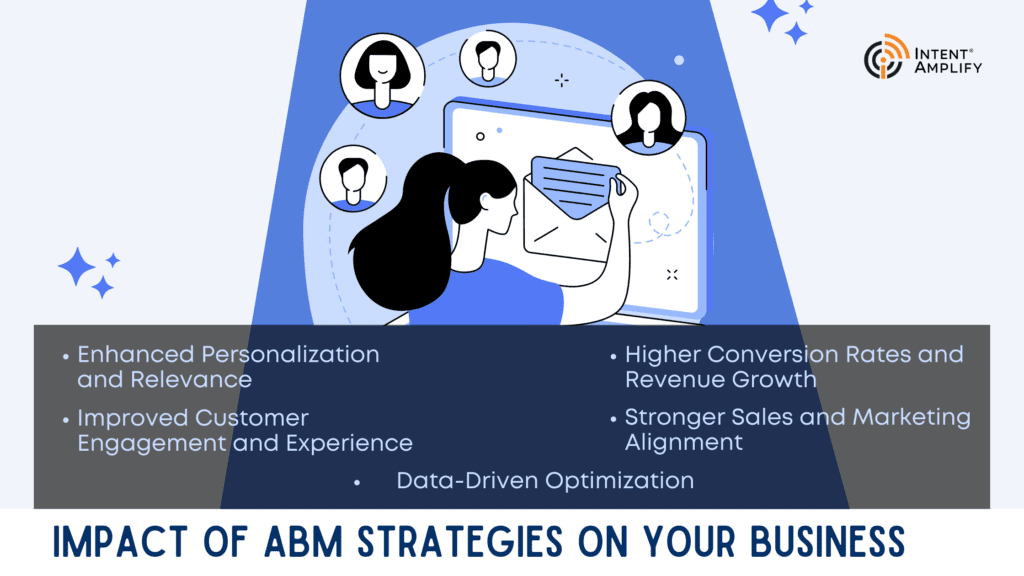
Effective ABM Strategies to Accelerate your B2B Sales Success
- Last updated on: June 6, 2023
Introduction
In the ever-evolving realm of B2B sales, where organizations endeavor to captivate and transform lucrative accounts, conventional marketing tactics may prove inadequate. Account-Based Marketing (ABM Strategies) has emerged as a powerful approach to bridge the gap by tailoring marketing efforts towards specific target accounts. By implementing the best practices of Account-Based Marketing (ABM), companies can enhance their ability to deliver tailored interactions, foster stronger connections, and ultimately attain outstanding sales outcomes.
This article delves into the most effective strategies for utilizing ABM techniques in B2B sales. It offers you with practical insights that can be implemented to optimize your sales performance and achieve greater success, but before we dive into the effective strategies, let’s have a look at what ABM is.
What Is Account-Based Marketing (ABM)?
Account-Based Marketing (ABM) is a targeted marketing strategy that prioritizes high-value accounts or companies over a wider audience. This approach involves tailoring marketing efforts to meet the specific needs and preferences of individual accounts, with the aim of building stronger relationships and driving more effective results. By focusing on a select group of accounts, ABM enables marketers to deliver more personalized and relevant messaging, which can help to increase engagement, conversions, and revenue. Account-based marketing is a strategy that focuses on customizing marketing initiatives to cater to the specific requirements and inclinations of individual accounts. The primary objective is to create personalized and significant connections with the target audience.
ABM involves marketing and sales teams identifying high-potential target accounts that can maximize revenue. Companies choose accounts based on their ideal customer profile, income potential, and strategic importance. ABM recognizes that each account is unique and deserves a customized approach. It stresses the necessity of focusing on high-value accounts.
Effective ABM Strategies For B2B Sales In 2023
After knowing about what ABM marketing is and how it benefits the B2B sales team, let’s have a look at the effective strategies to implement ABM and leverage it to its full potential.
1) Identify and Prioritize High-Value Accounts
To effectively implement Account-Based Marketing (ABM) techniques, it is crucial to first identify and prioritize high-value accounts. This initial step lays the foundation for a successful ABM strategy.
Through data analysis, market research, and understanding customer behavior, you can develop a clear profile of your ideal customer (ICP). Focus your resources on accounts with the highest revenue potential. This targeted approach helps maximize returns. Using a scoring system or predictive analytics, you can identify accounts that closely match your ICP. This approach enables the implementation of focused Account-Based Marketing (ABM) strategies.
2) Develop Personalized Account Plans & ABM Strategies
After pinpointing your desired target accounts, the subsequent course of action is to devise customized account plans. It is imperative to customize the plans according to the unique requirements, challenges, and objectives of every account.
It is imperative to conduct comprehensive research on the organization, including its key decision-makers and influencers. This will provide valuable insights and help in making informed decisions. By utilizing this information, you will be able to create messaging that is tailored to the specific challenges and objectives of the account, resulting in highly relevant and personalized communication. Establishing trust and building stronger relationships can be achieved by demonstrating a deep understanding of the business.
3) Leverage Multi-Channel Marketing

ABM techniques prioritize a comprehensive marketing strategy that utilizes multiple channels to effectively engage with target accounts. By integrating multiple channels, including email, social media, direct mail, events, and personalized CX, businesses can effectively engage decision-makers at various touchpoints.
To ensure a seamless and unified experience for your audience, it is crucial to maintain consistency in your messaging and content across various channels. This will help you establish a coherent brand identity and reinforce your message effectively. It is crucial to maintain a strong presence in the spaces where your target accounts frequent. This will help to ensure that your brand stays at the forefront of their minds as they progress through their purchasing journey.
4) Nurture Relationships with Personalized Content
The significance of content cannot be overstated when it comes to Account-Based Marketing strategies. Craft compelling and informative content that speaks directly to the unique pain points and challenges experienced by your target accounts. Ensure that your content is both engaging and educational, providing valuable insights and solutions to your audience. Craft your content in a way that connects with the various stakeholders who play a role in the purchasing journey.
Offer them meaningful perspectives and remedies. Tailoring content delivery to match the account’s industry, role, and position in the buyer’s journey is crucial for effective marketing. By personalizing the content, you can ensure that it resonates with the audience and addresses their specific needs and pain points. This approach can help to build trust and credibility, ultimately leading to higher engagement and conversion rates. By providing pertinent and valuable content, you establish yourself as a reliable consultant and visionary, fostering connections and impacting buying choices.
5) Collaborate with Sales Teams
For a successful implementation of Account-Based Marketing (ABM), it is crucial to establish a close collaboration between the marketing and sales teams. It is recommended to establish regular communication and alignment between the two departments to ensure consistent messaging and coordinated efforts.
Provide sales teams with valuable insights, feedback, and account-specific information to empower them to engage in informed and personalized conversations with potential customers. By collaborating effectively, you can create a CX that is smooth and seamless. This, in turn, will assist you in increasing your conversion rates and maximize the effectiveness of your account-based marketing (ABM) efforts.
6) Measure, Analyze, and Optimize
Establishing key performance indicators (KPIs) and tracking relevant metrics is crucial in measuring the effectiveness of your ABM techniques. It is essential to keep a close eye on the engagement, conversion rates, revenue generated, and customer retention metrics that are specific to your target accounts.
This will help you to better understand the effectiveness of your marketing efforts and make informed decisions to optimize your strategies. By utilizing marketing automation platforms, customer relationship management (CRM) systems, and analytics tools, businesses can collect valuable data and derive meaningful insights to inform their decision-making processes. It is crucial to consistently evaluate the outcomes of your ABM strategies and make necessary adjustments based on the feedback received. This approach will not only improve the effectiveness of your future campaigns but also lead to better sales outcomes.
Impact Of ABM Strategies On Your Business

Implementing the ABM strategies mentioned above can greatly enhance a business’s performance and yield meaningful results. By adopting Account-Based Marketing, companies can anticipate a range of advantages, including:
1) Enhanced Personalization and Relevance
Account-based marketing lets companies tailor campaigns to specific accounts. This method creates individualized, relevant messaging. Businesses must understand each account’s difficulties, aspirations, and pain areas and give customized solutions to become trusted advisors. Personalization increases engagement and resonates with target accounts. This strengthens relationships and boosts conversions.
2) Improved Customer Engagement and Experience
ABM strategies focus on engaging target accounts across channels and touchpoints. Multi-channel marketing allows organizations to reach key decision-makers and influencers along the buyer’s journey. Businesses may keep their brand top-of-mind with a complete engagement strategy. For brand loyalty, this strategy provides a seamless and unified customer experience. Target accounts feel valued, understood, and helped by a personalized and attentive approach, which fosters loyalty and long-term engagements.
3) Higher Conversion Rates and Revenue Growth
ABM prioritizes high-value accounts, optimizing resource allocation and conversion rates. Businesses can focus on prospects with a greater conversion rate by targeting accounts that meet the desired customer profile and have higher revenue potential. Account-Based Marketing (ABM) helps firms build trust with their target audience by using individualized and tailored techniques. This boosts conversions and revenue.
4) Stronger Sales and Marketing Alignment
Account-based marketing (ABM) is a strategic approach that fosters a strong partnership and synchronization between sales and marketing departments. Businesses working together to identify target accounts, share information, and coordinate activities can improve customer experiences and sales. Marketers may help sales teams have meaningful dialogues with prospects by working together. Provide account-specific information, personalized content, and important insights. Sales and marketing synchronization boosts ABM and streamlines the sales process.
5) Data-Driven Optimization
ABM’s data-driven approach lets organizations constantly evaluate and improve their strategy. Organizations may identify areas for improvement and make data-driven decisions by measuring engagement, conversion, and target account income. An optimization approach provides insights to improve future ABM initiatives. This improves performance and ROI.
Wrapping Up!
By implementing account-based marketing strategies you can create targeted and customized methods for sales, concentrate on valuable accounts, enhance your connections, and increase revenue. To fully harness the potential of ABM techniques, it is crucial to identify and prioritize target accounts, create personalized account plans, leverage multi-channel marketing, nurture relationships with personalized content, collaborate with sales teams, and consistently measure and optimize your efforts.
By strategically allocating resources towards the most promising accounts and implementing customized strategies, businesses can elevate their performance and attain outstanding results within the highly competitive B2B industry.
So what are you waiting for? Plan your personalized ABM strategy according to your accounts with Intent Amplify today and see your business soar!




